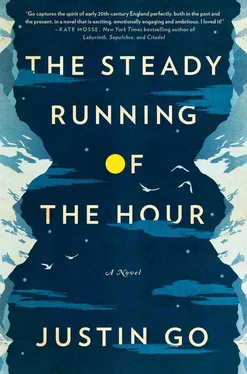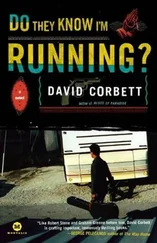An elderly woman comes out onto the porch, her forearms tucked into her apron. She does not smile or greet us. The librarian parks the car and turns to me.
— Do you want me to come with you?
— I might need a translator.
We get out of the car. The librarian introduces himself to the old woman. The conversation is brief and halting. The old woman walks into the house, leaving the door open behind her.
— She’s the caretaker, the librarian says. She’s invited us in.
The living room is sparely furnished and impeccably clean. We hang our coats on a rack and sit at a dining table. The librarian talks with the caretaker for some time, his hands folded awkwardly in his lap. Suddenly the caretaker addresses me in English. She has an accent I can’t place.
— I’m sorry, she says, I thought you spoke Icelandic. Would you like coffee?
The woman goes into the kitchen and returns with two cups of coffee and a plate of stale cookies. I gulp down the sour coffee, cracking the hard cookies with my molars. The librarian and the caretaker are still talking. She turns to me.
— I understand you’ve come to see Ms. Östberg. But she’s resting at the moment. I wondered if you could come back another time?
I tell the caretaker that it would be difficult to return, because I don’t live in this country and have no place to stay nearby. Then I explain that I’m seeking information about a woman named Imogen Soames-Andersson. The caretaker looks at me, and if she has ever heard the name her face does not reveal it.
— I don’t know the name, she says, but Ms. Östberg might be able to help you. Perhaps I could wake her. It would be a shame for you to miss her, since you’ve come so far. We seldom have visitors.
The caretaker excuses herself and goes down the hall. The librarian turns to me, his eyes large and shining.
— I don’t think you should go in there. Even if it’s really her, you’ll never get the money. Let’s get out of here—
The caretaker comes back into the room.
— Ms. Östberg is awake. You can see her now, but she’d prefer if you spoke in her bedroom.
I stand, glancing at the librarian, but he only shakes his head slightly, a strange expression on his face.
— Her English is quite good, the caretaker adds, so you won’t need anyone to translate. It’s the door at the end of the hallway.
I thank her and begin toward the corridor. The woman stops me with a wave.
— I forgot to tell you. The lock on her door is broken. You need a key to open it from the outside.
The caretaker draws an iron key from the front of her apron and hands it to me. It is an old barrel key, as wide as my hand with a long shaft and a tooled bit at the end. A length of ribbon is tied to its eyelet.
I walk down the dark hallway. The wooden floorboards are worn smooth and shiny. I pass closed doors on both sides of the corridor until I reach the door at the end. The key is in my hand.
I hesitate at the door. Then I see the shaft of light on my shirt, a small yellow beam. I wave my hand out of the shadows and the beam fixes on my wrist. It’s coming through the keyhole. I put the key in the metal fitting and turn it, feeling the bolt swing smoothly. Not any more , I think, or any less.
I walk in.

23 June 1924
Schöneberg, Berlin
She watches the shadow of the streetcar glide past on the sidewalk, steel clattering upon iron as the wheels roll over a junction in the grooved tracks. The streetcar halts. The woman studies the white placard displaying the number 8.
She breaks into a jog, pushing down the crown of her hat. A leather portfolio is tucked under her arm; the camera slung over her shoulder bobs against the small of her back. The conductor watches the woman climb onto the streetcar and lean her portfolio against the wooden paneling. She draws out her purse, offering a coin inquiringly.
— Fährt dieser Straβenbahn nach der Auguste-Viktoria-Platz?
The conductor takes the woman as French on account of her accent and her strange clothing. He does not care for the French, but he tells the woman the streetcar does stop at Auguste-Viktoria-Platz. He tells her the fare. The conductor is used to telling passengers the fare, for only a year ago under the old Papiermark the fare had climbed to 150,000 marks.
The woman pays the conductor and moves down the aisle, grasping a handrail above her head. An old man stands and doffs his homburg, offering his seat.
— Bitte nehmen Sie Platz .
She smiles, explaining she would prefer to stand. The old man does not believe her, but he taps his hat low over his forehead and sits back down. The woman turns and shifts her weight onto the handrail, staring at a young girl on the seat across from her. The girl wears a white frock, its rounded collar tied by a long blue ribbon; she holds a porcelain doll in her arms, the paint rubbed off entirely from its face. The woman guesses at the age of the child, but in the end she realizes she has no facility for this judgment.
She frowns and looks out the window, studying the faces of the pedestrians on the sidewalk. Her mind returns to the old question of the Teutonic features. Is it only their expressions that make them severe? The Germans remained an enigma to her, and in years past she had considered them a species apart, a people with some anatomical divergence of nerve or gland that accounted for their facility with the problems of this world, the way they systematically solved every obstacle that came along, even the impossibility of their present hardship. She had long admired them for this, differing as they did from her. But was it true? Perhaps there was hardly any difference, perhaps she only imagined how these faces differ from those she might see in Copenhagen or Rotterdam. Her eyes follow the back of a man walking briskly on the sidewalk. Was he a German, and could she tell from the back? There is something familiar in the roundness of his shoulders; the angle of his gray trilby, ever misshapen; the curious rigidity of his gait. Could it be Anton? Of course it could not, for the last she had heard Anton was in Brazil.
She lowers her gaze in distress, studying the cuff of a young man’s trousers, the greased crow-black boots of the conductor. She imagines the tram passing the figure on the sidewalk; she pictures the familiar body growing closer, the closest it had been in years and now passed, the distance only gaining between them. Now she is regretful, almost shameful. There was nothing so hateful to her as the fragility of human relations, and love most of all. She had always felt so. As a girl she had never understood the affairs of others, those who had lain with lovers for months and years only to part bitterly, only to pass each other on the street as mere strangers. That was not love, she had felt. That was caprice; that was whimsy. It was not love.
But later it had happened to her too. She had lain with them; they had held each other and promised all they could promise, the past and future alike. And now they were nothing to each other, or as little as two people were who would never speak again. How little remained from such episodes, dimming memories vouchsafed only by scraps of evidence unearthed years later: a visiting card dropped behind a chest of drawers; a pair of earrings in their silken gift box, never worn. She was still fairly young, and yet the affairs of her youth were things hardly remembered, unfocused images she had blurred by trying to picture the same scenes too often. Anton had never been her lover, but she felt the same discomfiture at his mirage, the inevitable embarrassment of the meeting of two people who had once been close but no longer were.
Читать дальше













